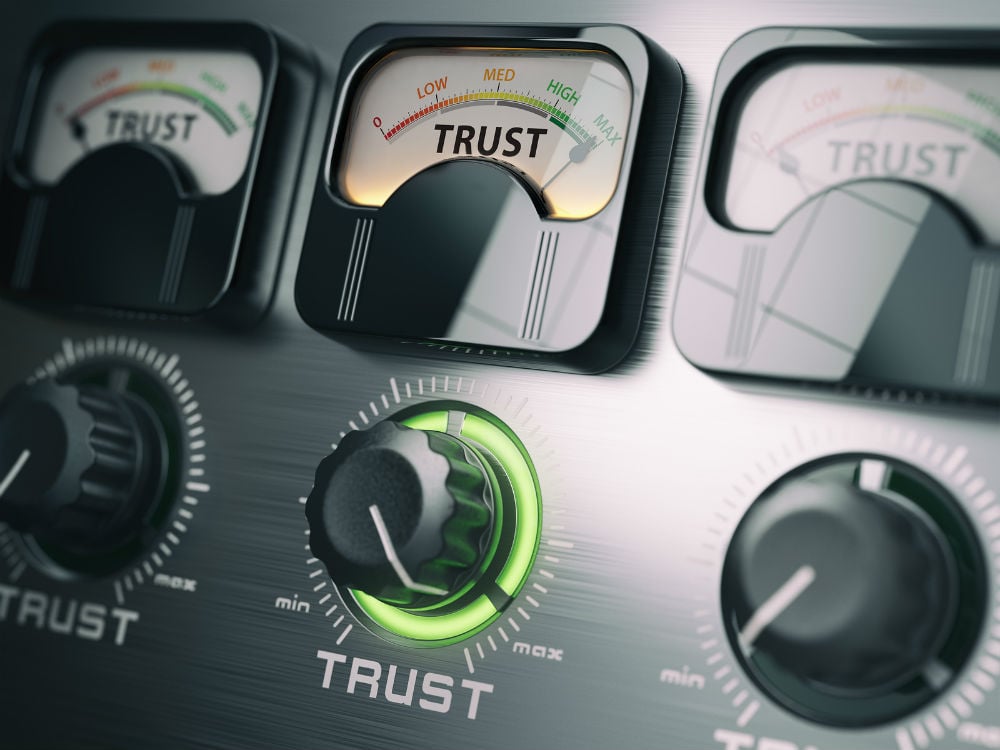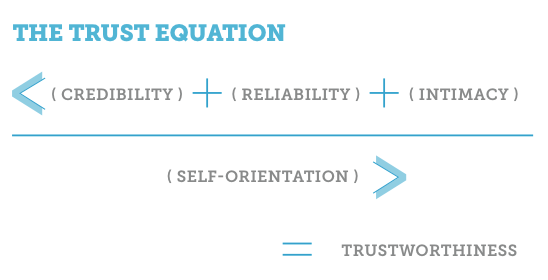
How to design a sales process that helps build trust
There’s no question that trust is critically important in sales. Without trust, sales falter. But have you ever given thought to what, exactly, “trust” is?
Charles Green has. A Harvard MBA, Green has studied the concept of trust in business for more than 20 years, and published several books on the topic including The Trusted Advisor and Trust-Based Selling. In a study of more than 7,000 business professionals, Green sought to understand the elements of trust, and developed a formula to describe what is necessary to build it:

© Image Copyright - Trusted Advisor
According to this formula, trust consists of three positive elements divided by one negative element. The higher one’s credibility, reliability, and intimacy, the higher the trust, while a high self-orientation on the seller’s part directly undermines the trust quotient.
The formula is effective in understanding the qualities of generalized trust, but in sales situations another factor comes into play: The buyer’s perceived risk. The higher the buyer’s perceived risk, the greater the difficulty in building the required trust to make the sale. Thus, the formula looks like this:
Credibility + Reliability + Intimacy
_____________________________
Self-Orientation + Perceived Risk
Let’s take a look at each element, and how your sales process can work to increase overall trust toward the sale.
Credibility
In a sales context, credibility refers to the buyer’s perception of whether the seller can be believed. It consists of a combination of expertise, integrity, and truthfulness.
A sales strategy that relies on large numbers of low-expertise sales reps making large quantities of scripted calls may make some sales, but such a sales team will not be successful in building consistent credibility. Credibility requires that each person who touches the customer is capable of credibly answering questions and addressing important business issues; or of connecting the buyer directly with someone who can.
A well-designed sales process provides connection points between buyers and the right people inside your organization at each point of the process. It also provides salespeople with information, coaching, and training at each step that helps them build their personal credibility both in the moment and over time.
Reliability
Reliability is the quality of consistently doing what you say you’re going to do. A consistent sales process is a no-brainer for building reliability both at the individual and organizational level.
Building your process into the salesperson’s daily workflow with a tool like Membrain helps keep salespeople on task and interacting with buyers in a consistent and reliable fashion. This, in turn, builds their perceived reliability with the buyer. A well-designed process also ensures that the buyer experiences reliability at the organizational level.
Intimacy
Intimacy refers to a combination of time and closeness of a relationship. Time can refer to time passed or the total amount of time spent together. Closeness can be increased or decreased based on the amount of vulnerability, self-revelation, and genuine interest we invest in each other.
Assuming that credibility and reliability are present, then the greater the intimacy, the greater the trust. We see this at play when we introduce someone with the words, “I’ve worked with Ethan for ten years and he’s always…” We instinctively know that the longer we’ve known someone and the more closely we’ve worked together, the greater the trust we can place in them (again, assuming that they have shown themselves to be trustworthy).
We also see this at play in the longer sales cycles associated with complex sales. The more that an individual or company is staking on a purchase, the more time (all else being equal) they will spend on the decision, and the more closely they will work with potential vendors and partners.
The sales process helps salespeople to build intimacy in several ways. By building in multiple touch points, you increase the time factor. A well designed process also helps salespeople to increase a sense of closeness with buyers. Intimacy in friendships grows in layers, and this is true in sales relationships as well. A great sales process helps the customer gradually open up and share in layers that continually build a sense of intimacy between the buyer and the seller.
Self-interest
While the first three factors, credibility, reliability, and intimacy increase trust, self-interest is one of two key factors that decrease it. Self-interest refers to the perception that the salesperson cares more about themselves than about the buyer. This single factor alone, if it’s high enough, can undermine everything else the salesperson does. It is responsible, in large part, for many of the negative stereotypes of salespeople.
Your sales process helps salespeople avoid the perception of self-interest when it walks them through the steps of uncovering the buyer’s needs and addressing the buyer’s concerns in a practical, helpful manner. A great sales process avoids promoting cheap tactics aimed at manipulating buyers, and focuses instead on guiding salespeople to focus on the buyer’s needs and decision-making process.
Perceived risk
Risk is one of the defining elements of a complex sale. The higher the perceived risk, all else being equal, the more complex the sale. Likewise, the higher the perceived risk, the harder it is to build trust.
Notice that we’re talking about perceived risk, not absolute risk. A well-designed sales process decreases the buyer’s perceived risk by helping them uncover their concerns and address them pro-actively. It may include low-risk steps that help the buyer to wade into the process before making a big-risk decision. It may also include opportunities for the buyer to connect with individuals inside the selling company who can help mitigate their risk. And it may include talking about risks they had not thought about themselves. This last recommendation is often rejected by salespeople, fearful to introduce additional risks, but it increases your trustworthiness, as it shows that you have their interest at heart (low self-interest) and that you can be relied upon.
Every organization is different, and the risks involved in each purchase are different. An effective sales process identifies the key risk points for buyers, and provides a roadmap for salespeople to address and mitigate those risks in order to increase the trust quotient.
Like the practice of sales itself, trust is both an art and a science. Fundamentally, true trust cannot be obtained without a foundation of integrity. If your sales teams include untrustworthy people, then you may want to re-examine your hiring and firing policies. If, on the other hand, your team practices integrity on a daily basis, then a good sales process can be an effective tool in helping them to establish that trust with their buyers.

By George Brontén
George is the founder & CEO of Membrain, the Sales Enablement CRM that makes it easy to execute your sales strategy. A life-long entrepreneur with 20 years of experience in the software space and a passion for sales and marketing. With the life motto "Don't settle for mainstream", he is always looking for new ways to achieve improved business results using innovative software, skills, and processes. George is also the author of the book Stop Killing Deals and the host of the Stop Killing Deals webinar and podcast series.
Find out more about George Brontén on LinkedIn








